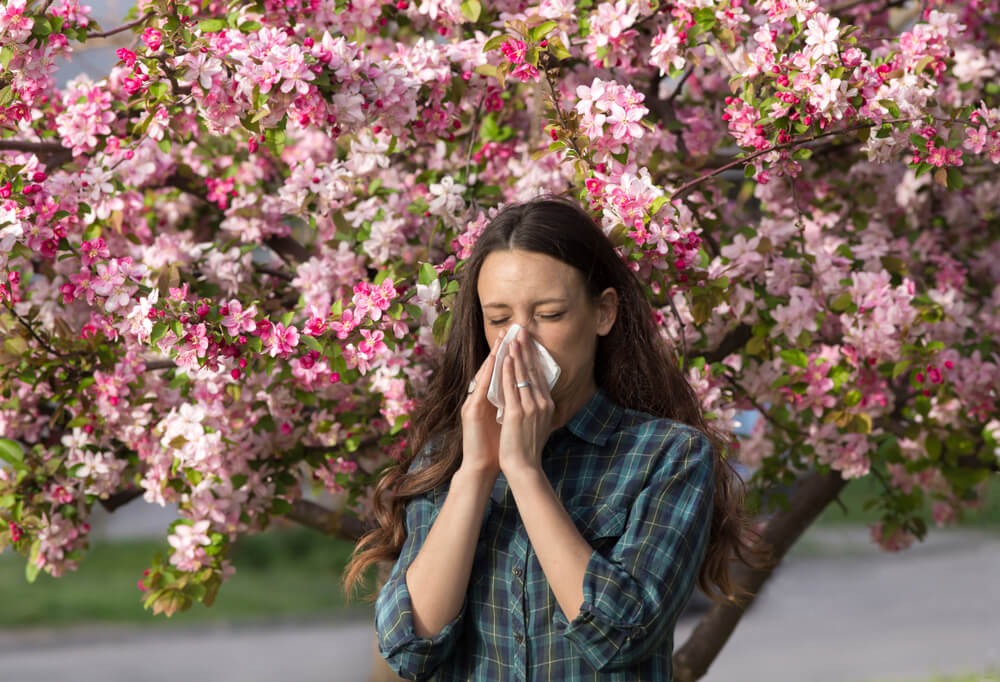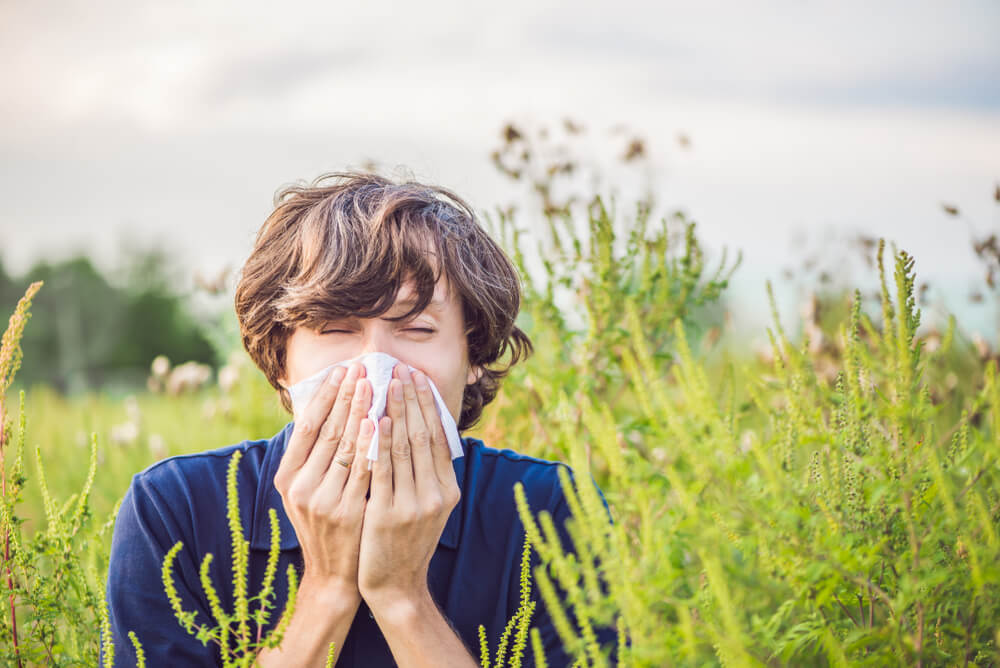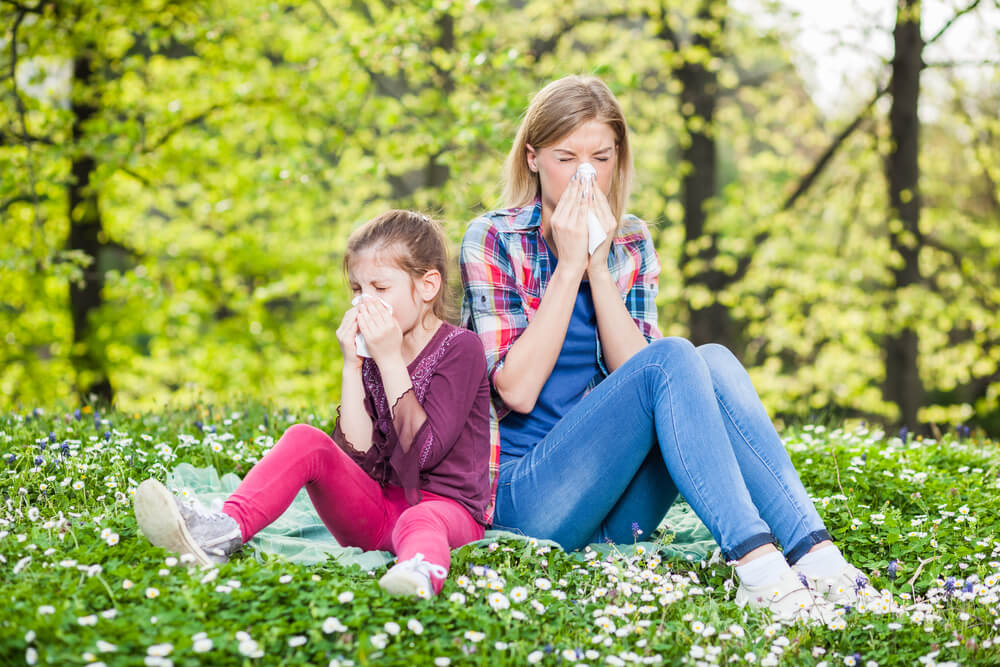In the medical field, “seasonal allergy” is called allergic rhinitis, which comes and goes with the seasons. It is most commonly known as hay fever, and around 10% of people in the United States suffer from it, mostly during spring and fall.
The name hay fever originates from the hay-cutting activities that usually occur during summer months and when people feel specific seasonal allergy symptoms.
The blossoming of flowers and trees is something that tends to be quite troublesome for people who suffer from seasonal allergies because their respiratory system struggles with different allergens i.e., substances that cause an allergic reaction such as pollen, dust mites, and alike. Pollen can come from various sources, such as trees, weeds, grass, flowers, etc. Still, interestingly enough, pollen from plants is heavy and cannot stay in the air for too long, so it is not as likely to cause allergic reactions as other mentioned allergens do.
Although they are called seasonal allergies, some people experience symptoms all year, including wintertime, because different allergens become active at different times during the year.
To be sure which allergens are causing you to suffer from environmental allergies, take part in allergy testing in Miami. There are different centers for allergy testing, such as the Allergy and Immunology Center, which offer fast, high-quality services, so make sure you research your options carefully before deciding where to go.
Causes of Allergies
Every season brings different triggers when it comes to the causes of seasonal allergies. Generally, people are allergic when their immune system recognizes a harmless substance in the air as dangerous. After that, the body reacts to the substance by releasing histamines and chemicals into the blood, and these chemicals create symptoms of an allergy.
Every season has different substances causing allergic reactions, so here are some of the most common ones:
- Spring allergies: During springtime, trees are primarily responsible for hay fever. Many people are allergic to pollen coming from certain trees such as cedar, willow, horse chestnut, etc.
- Summer allergies: Summertime is reserved for allergens from the grass, such as timothy grass and ryegrass, including some weeds.
- Fall allergies: Fall usually brings allergies connected to ambrosia, which contains around 40 different species worldwide. These plants are considered to be invasive and very hard to control, with severe symptoms. Additionally, plants such as sorrels, fat hens, nettles, and others are also allergens appearing during fall.
- Winter allergies: Although it sounds unlikely that allergens can be active during winter because most of the outdoor ones are stagnant, we often forget that people spend a lot more time inside, making themselves prone to indoor allergens such as mold, dust mites, pet dander, etc.
Seasonal Allergies Symptoms
Environmental allergies can be visible through several symptoms, out of which the most common ones are:
- Runny nose
- Sneezing
- Itchy eyes
- Watery eyes
- Itchy sinuses
- Itchy throat and ears
- Congestion of the ears
- Headache
- Allergy cough
- Wheezing
- Short breath
- Worsened asthma symptoms (if you have asthma)
Seasonal allergy symptoms are usually not severe and can be treated in different ways, which we listed in the continuation of this article. If the symptoms worsen, and you do not feel like you can handle them by yourself, contact your chosen medical professional as soon as possible.

Diagnosing Environmental Allergies
Regardless if you suffer from winter allergies or summer ones, or your critical periods occur during fall and springtime, diagnosing hay fever is much easier than it is the case with other types of allergies. If you experience the abovementioned symptoms at a certain point every year, you probably suffer from sessional allergies.
Usually, there is no need for allergy testing because your doctor will check your nose, ears, and throat to give a diagnosis, and most seasonal allergies are treated in the same manner.
Treating Hay Fever
There are many different steps you can take to relieve the symptoms of seasonal allergies, so we have created an exhaustive list of remedies and treatments, as well as precautionary measures when it comes to hay fever symptoms.
- One general advice all experts give is to try and avoid exposure to allergens that trigger the above-listed symptoms. Some of the ways to reduce the exposure are to stay indoors during windy weather, avoid mowing the lawn, gardening, and other similar types of activities, remove clothes you wore outside and shower after exposure, avoid hanging clothes outside to dry, and wear a mask for outdoor activities.
When it comes to indoor vs. outdoor allergens, it is essential to take note that indoor allergens are a lot easier to remove from the environment, and it can be done by washing the bedding in hot water, covering the bed with anti-allergen sheets, removing carpets from the floors, cleaning water damage and water leaks to avoid mold, taking care of mold as soon as it starts to appear and alike.
- Using air-conditioning with a filter for cooling, especially for summer allergies, might help fight allergies, monitor the pollen levels, and stay at home when the counts are high. For additional protection, try to keep the windows shut and avoid cigarette smoke because it can only worsen the already existing symptoms. Also, avoid outside activities early in the morning because the allergen counts are the highest at that time of the day.
- Keeping the inside air clean is a crucial step when fighting seasonal allergies. These are some of the actions which can help: keep the air dry by using an air dehumidifier, use HEPA (high-efficiency particulate air) filters in the bedroom, clean your floors with a vacuum cleaner with a HEPA filter as often as possible and generally use air-conditioning in the household wherever possible, as well as in your car.
- Medicines are also an option when you are struggling with hay fever because they can help ease the symptoms such as nasal congestion, allergy cough, dizziness, sneezing, etc. Several remedies can be taken without a prescription, such as nasal sprays with corticosteroids, oral antihistamines, oral decongestants, and nasal sprays with cromolyn sodium. Alongside this, your chosen doctor can prescribe medication such as steroid nasal sprays and allergy shots which can help as well.
Be aware that some allergy medications can have side effects such as confusion, fogginess, dizziness, etc., so be prepared that not all allergy medicine is suitable for everyone.
- Rinsing the sinuses with a saline liquid called nasal irrigation is a very effective way to deal with congestion in your nose. You can buy the solution or make it yourself by using a liter of water, one teaspoon of baking soda, and 1.5 teaspoons of salt.
- Different experts state that alternative treatments are beneficial when fighting seasonal allergies, and the ones used most often are spirulina, herbal remedies, quercetin, vitamin C, and bacteria found in yogurt called lactobacillus acidophilus. Of course, many of these treatments are still to be additionally researched to be considered as highly efficient remedies.

Visit Us!
Knowing the status and severity of your seasonal allergies is the first step to recovery. Make sure you visit our center and let our experts help you with advice on how to fight and overcome allergic rhinitis.


